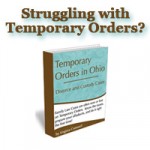A Columbus Ohio Divorce Attorney article about divorce in Ohio
NO – NO – NO, a thousand times NO! This is by far the most common legal myth we encounter. Your friends and family will tell you with authority that they are CERTAIN that you have to get a divorce in the state you were married in. This is not true.
In order for a court to have jurisdiction, the state must have personal jurisdiction over at least one of the parties to the marriage. Generally, this means that you must get divorced in the state where at least one of the parties lives. While this jurisdiction will be enough to grant the divorce, in Ohio, if the Defendant is only served by publication (because his or her whereabouts are unknown), then the court does not have jurisdiction to make orders regarding the assets and liabilities of the parties, only to grant the divorce.
In addition, in order for a court to have jurisdiction over the custody of a child, a court must have jurisdiction pursuant to federal law (Parental Kidnapping Prevention Act or PKPA) and state law, which often follows the Uniform Child Custody Jurisdiction and Enforcement Act (UCCJEA).
To better understand which state has jurisdiction in your Ohio case, please call our office or the attorney of your choice to schedule a consultation.
You may also be interested in our “Divorce in Ohio” series by a Columbus Ohio Divorce Lawyer and Columbus Ohio Divorce Attorney about the process and options for ending your marriage in Ohio, and about Ohio divorce laws.
The first articles in the series can be seen here, but there are many more:
Part 1 (Conciliation or Legal Separation), Part 2 (Dissolution or Uncontested Divorce), Part 3 (Reasons to Choose Divorce), Part 4 (Restraining Orders),Part 5 (Where will you live?), Part 6 (Paper Work), Part 7 (Health Insurance), Part 8 (Attorney Fees), Part 9 (5 Dirty Divorce Tricks), Part 10, (5 More Dirty Divorce Tricks).
In addition to the installments in the Divorce in Ohio Series (see links at top of the page), you may also find the following topics, which relate to divorce, to be helpful.
Adultery, Annulment, Alimony (Spousal Support), Best Interest of the Child, Child Custody, Child Custody Jurisdiction, Child Support (deviation), Child Support (how much), Child Support (how to pay), Child Support (lower), Child Support (myths), Child Support (resources), Child Support (sign up),Contempt, Dissolution, Divorce Basics, Divorce Myths, Foreclosure Mediation, Grandparents, Guardian ad Litem, House, How Long Your Divorce May Last, International Abduction,Legal Separation, Mediation, Moving, Packet of Forms vs. Getting a Lawyer, Prenuptial Agreements (Antenuptial Agreements), Shared Parenting, Temporary Orders, Temporary Orders Affidavits,








